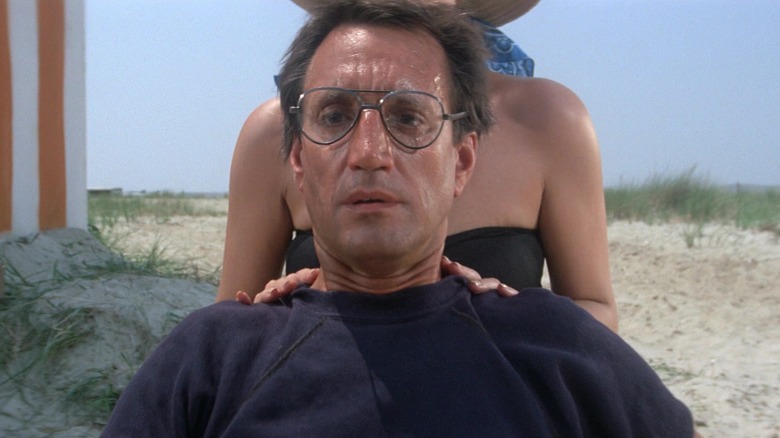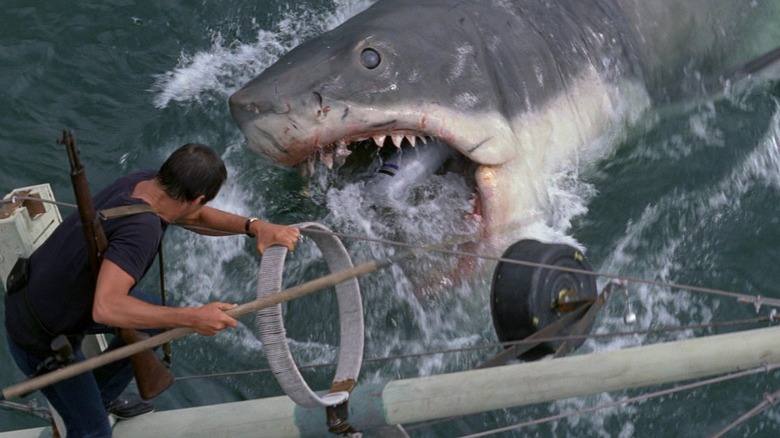One Of Steven Spielberg's Best Movies Almost Went To A Different Director
What if Bruce, the mechanical shark in "Jaws," had actually worked? It's one of the biggest what-ifs in Hollywood history. While the movie's Great White Shark may have been "a perfect engine" (to quote Richard Dreyfuss' bespectacled scientist Matt Hooper), Bruce — who got its moniker from Steven Spielberg's lawyer, Bruce Ramer — was anything but. Because of this, Spielberg and editor Verna Fields were forced to reconfigure the film's raw footage to avoid showing "The Great White Turd" (as the movie's crew came to call it) as much as possible. What emerged was a triumph of minimalistic horror filmmaking where what you don't see is just as terrifying as what you do, if not more so.
But what if Spielberg had never gotten to direct one of his all-time best movies to begin with? It's easy to recognize in hindsight that ol' Stevie Boy was fated to adapt Peter Benchley's pulpy best-seller, but at the time he only had two feature films under his belt. One of them, 1974's "The Sugarland Express," was a moderate success, while the other, Spielberg's 1971 feature debut "Duel," originated as a TV movie. Looking back at the latter, one can readily spot elements of "Jaws" and its DNA in the filmmaker's white-knuckle tale of a traveling salesman terrorized by a relentless, unseen semi-truck driver, from its stripped-down primal thrills to the way it subverts the notion of small-town America as a wholesome haven.
Despite this, Spielberg wasn't producers David Brown and Richard Zanuck's first choice to helm "Jaws." Heck, he might've gotten passed over entirely, had his primary competition — Dick Richards, who was then still some years away from becoming an Oscar nominee for producing the Sydney Pollack comedy "Tootsie" — not irked Benchley something fierce during their first meeting.
You yell whale, everybody says 'Huh? What?'
One doesn't exactly have to squint to spot the ways "Moby Dick" influenced Benchley's novel. Supposedly, an early "Jaws" script draft even had Quint (Robert Shaw), the Ahab of this salty tale, laughing his ass off watching John Huston's 1956 movie version of Herman Melville's touchstone adventure novel in a theater (a scene that was presumably, and fairly, deemed too on-the-nose). It seems Richards similarly had "Moby Dick" on his brain when he met Benchley, Brown, and Zanuck, seeing as he kept referring to the film's man-eating antagonist as a "white whale."
Richards, who had landed on the producers' radar thanks to his 1972 revisionist Western "The Culpepper Cattle Co.," quickly found himself out of the running thanks to his faux pas. Spielberg confirmed the story in an interview from Laurent Bouzereau's book "Spielberg: The First Ten Years" (via Vanity Fair), explaining that he had approached Brown and Zanuck about directing "Jaws" himself only to learn they were meeting with someone else. In his own words:
"That was that, until I got a call from Dick asking me to come meet with him and David. They sat me down and announced, 'We want you to direct 'Jaws.” I said, 'Whatever happened to the director?' And they explained, 'We had the meeting with him, but he kept referring to the shark in front of Peter Benchley as 'the white whale.' And Peter became very disinterested in having his shark called a whale.' And that's how the project finally came to me."
Would Richards have landed the job, had he not kept mixing up his sea critters? One's imagination could run wild thinking about the alternate reality in which Spielberg didn't make his blockbuster saga of man versus shark. What a whale of a tale that might've been! (Apologies to Mr. Benchley.)

